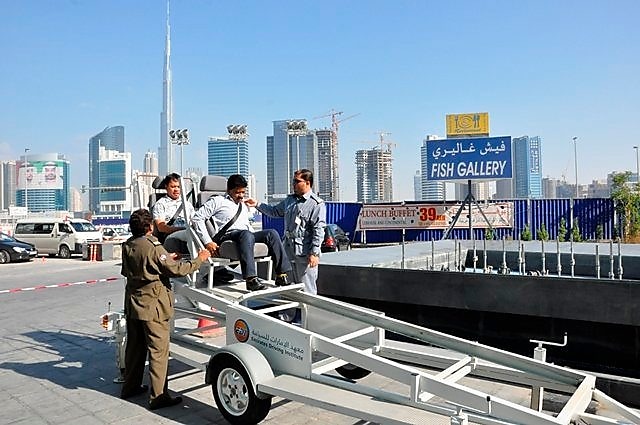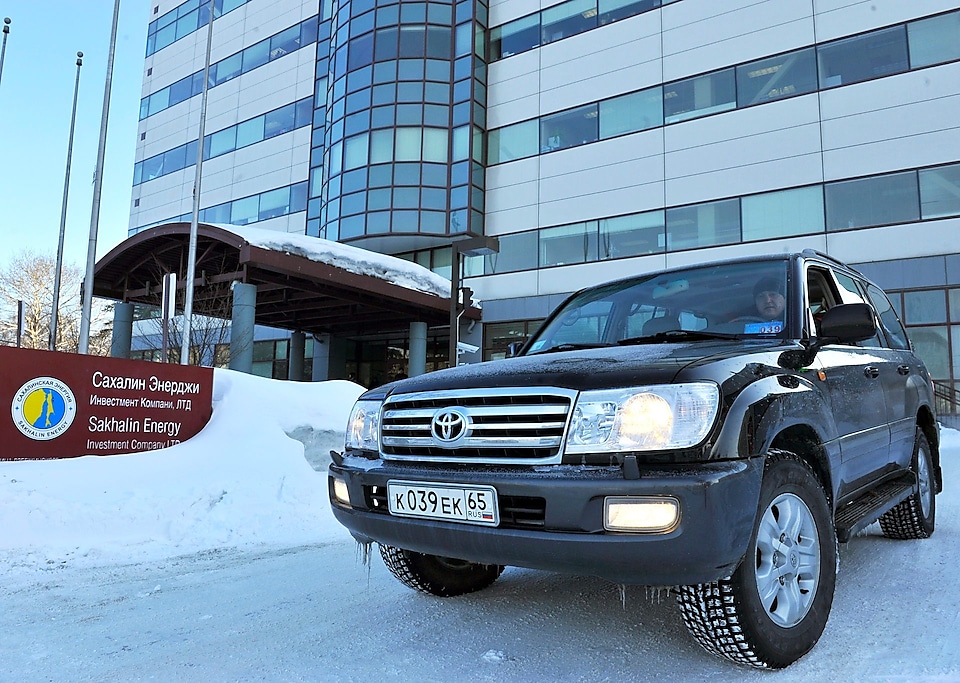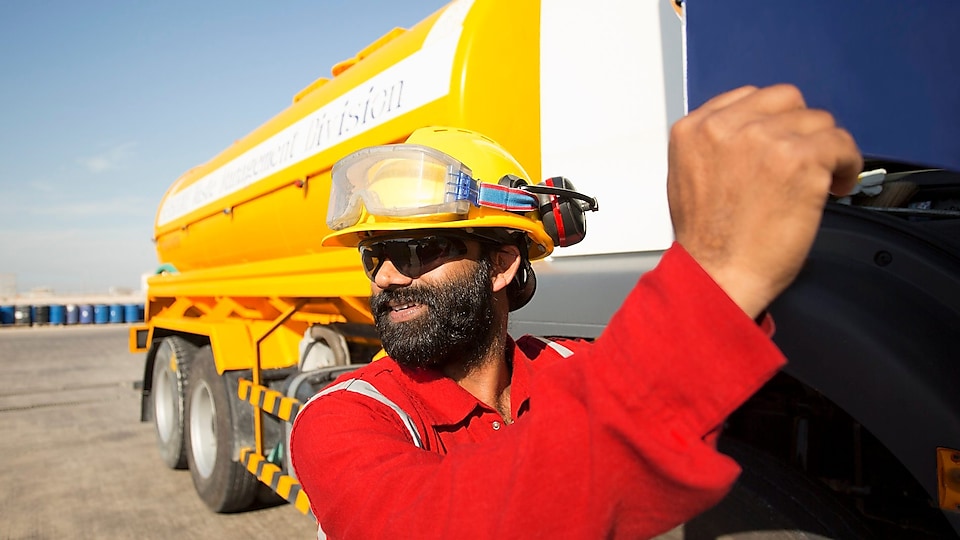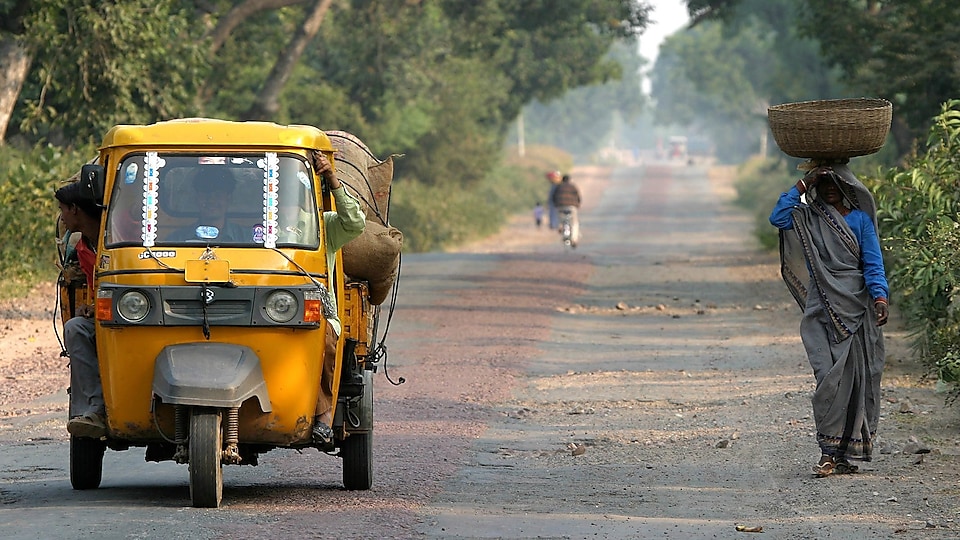Title: Shell Humrahee
Duration: 6:16 minutes
Description:
Project Humrahee is one of the many initiatives of Shell which intends to identify quality drivers and provide training to them.
Thousands of Shell staff and contractors across India as well as Asia took part in safety roadshows and hands-on demonstrations at their offices and facilities today to mark Shell's annual Safety Day.
[Background music plays]
Quiet, dramatic music
[Video footage]
A blood-red sun in a smoky sky.
Busy, congested traffic.
Alternating footage of pedestrians walking along very busy roads and views of commuter traffic - bikes, both motorised and pedal-cycle, heavy vehicles, passenger vehicles and tuk-tuks - streaming along.
[Voiceover]
140,000 people die every year on India’s roads. That’s over 2,500 people per week.
[Background music plays]
Music becomes very quiet and subdued and a heartbeat can be heard.
[Video footage]
A woman, holding a young schoolgirl’s hand, keeps a wary eye on traffic as they cross the road.
[Voiceover]
Most of these deaths are caused by human error and could have been prevented.
[Video footage]
Night-time public security video camera footage of traffic streaming along a busy road.
Newspaper clippings of motor vehicle fatalities are slammed down on top of one another. Blood pools around the clippings as they fall.
[Voiceover]
In this challenging environment, Shell has set up a programme that tries to tackle this problem head on.
[Video footage]
Close-up of a seatbelt being buckled. Close-up of a foot depressing an accelerator.
Driving simulator footage of a busy mountain pass.
[Text displays]
Humrahee
[Background music plays]
Music reaches a crescendo. The quiet, dramatic music resumes.
[Video footage]
Dawn or dusk footage of a truck passing by on a busy road.
Various angles, from within the truck cabin, of Ravinder driving.
[Humrahee Certified Driver]
[Ravinder Singh]
[Text displays]
Subtitle of translated speech:
When I was in the twelfth standard in school, I failed that year. So my father asked me to find work for myself and start earning. There used to be truckers driving through our village. I came with them and that is when I learnt how to drive, and started driving.
[Video footage]
Ravinder’s truck travelling along a highway.
Close-up of Ravinder flipping a headlight lever.
Close-up of Ravinder’s face as he navigates traffic.
Rear view of Ravinder’s truck. It is indicating right as it travels along the road.
[Voiceover]
There are so many heavy vehicles drivers like Ravinder in India. They spend their lives travelling hundreds of kilometres every day with little sleep, a deadly combination.
[Video footage]
A road bustling with heavy vehicles. Various scenes, both daytime and night-time, of trucks barreling along busy roads.
View of the road ahead illuminated in a truck’s headlights.
Close-up of Ravinder’s profile as he concentrates on the night-time road ahead.
[Ravinder Singh]
[Text displays]
Subtitle of translated speech:
I was paid well, but risks to life were much higher. For example, I had to reach Calcutta from Mumbai in 36 hours. Even a train cannot reach Calcutta in 36 hours but we were expected to reach there in that much time. Because of this risk to my life I left the job.
[Video footage]
View of heavy night-time traffic from Ravinder’s truck.
Day-time footage from within Ravinder’s truck of trucks whizzing by.
[Voiceover]
But Ravinder’s story is not unique and accidents through fatigue are frequent.
[Video footage]
View from within the truck cabin of Ravinder driving.
A busy road: motorcyclists whizz by, hooting loudly.
Various scenes of heavy daytime and night-time traffic.
[Voiceover]
In this challenging environment Shell responded by setting up a new programme.
[Background music plays]
Music becomes lighter and more uplifting.
[Video footage]
Night-time public security video camera footage of traffic streaming along a busy road.
Daytime public security video camera footage of a busy city intersection.
[Voiceover]
First, driving behaviour was studied across the world, in countries where the rate of accidents was low. They took this learning and created a plan to improve driving patterns of Shell India’s truck drivers. And Humrahee was born.
[Video footage]
Aerial footage of a busy city intersection.
Various scenes of busy city streets.
View across rooftops of a large seaport.
Various scenes of trucks on Indian roads.
Aerial footage of a gate guardhouse, car-park and truck depot.
[Text displays]
Subtitles of speech:
Looking at the data, which we have done some analysis, when we see the tremendous reduction in non-Shell trips also, which is really helping.
[Video footage]
Tony Joseph and a colleague seated in an office, discussing the Hamrahee Project.
[Project Manager, Humrahee]
[Tony Joseph]
I look at road safety as a matter which can change the whole scenario of a family. Today he goes out to work, he is the sole breadwinner of the family, he doesn’t return home. So there are so many people in this country who get impacted by it. The whole family’s social structure itself changes.
[Video footage]
Close-up of truck wheels on a truck on a busy road.
View from inside the truck cabin of Ravinder driving.
Close-up of Ravinder’s left profile.
A view of oncoming traffic. Hooters can be heard blaring.
[Voiceover]
Humrahee is a Hindi word which means travel companion in a long, arduous journey. It is now an independent accreditation programme for India’s heavy vehicle drivers.
[Video footage]
The Shell emblem proudly displayed on the front apex of a building.
Aerial view of a truck depot.
Aerial view of a truck making its way slowly through a weigh station.
Footage, from various angles, of trucks in the depot.
[Tony Joseph]
Humrahee is a comprehensive road safety programme which enables the driver to behave safely on the road. And the driver also becomes an influencer to other drivers to ensure that they also drive safe, which in turn will make our roads safer.
[Background music plays]
Music changes tempo as the beat increases and becomes livelier.
[Video footage]
A man instructs a driver seated in front of a driving simulation console.
View from over the shoulder of a driver using the driving simulation console. The instructor stands by to give advice.
Extreme close-up of a hand turning a key in the ignition.
Close-up of a foot depressing the accelerator.
[Voiceover]
The programme follows multiple steps of modules. It starts by pre-screening drivers to measure their behaviours and attitudes and uses driving simulators to mimic road conditions.
[Video footage]
The driving simulation office: a driver and instructor are busy at the console in the background.
Various screen shots of settings on the driving simulator screen.
Close-up of a driver’s hands on the steering-wheel.
Close-up of the driver’s face as he concentrates on the simulator screen.
The instructor offers advice to the driver.
[Trainer, Humrahee]
[Subba Rao]
Simulation is a good practice for the driver. Whatever he is supposed to do on the actual road, he will be practising it himself, so lane driving, discipline, road rules and regulations and hilly driving, night driving, foggy driving.
[Video footage]
Close-up of the traffic seen on the simulator screen.
Close-up of driver’s hands on the simulator steering-wheel.
Simulator screen: a country road with minimal traffic approaching from the right.
Simulator screen: a large intersection in foggy conditions.
Close-up of the driver’s hand shifting gears.
Simulator screen: a moderately busy mountain pass. The truck’s windscreen wipers are in use.
Simulator screen: a night-time country road, with traffic approaching from the right.
Simulator screen: a rural dirt road, in dense fog, with slow oncoming traffic on the right.
[Voiceover]
Evaluations, behavioural profiling and eye tests are all part of the programme. Each driver needs to spend a minimum of 30 hours over a 6-month period training.
[Video footage]
Close-up of a hand pressing a key on a keyboard.
Simulator screen showing settings for driving.
Subba, the driving instructor, giving advice to a driver seated at the driving simulator.
Simulator screen: a narrow mountain pass, with moderate amount of traffic approaching from the right. The windscreen wipers are in use.
Close-up of the driver’s hands on the steering-wheel.
The driving simulation office: a driver and instructor are busy at the console in the background.
[Voiceover]
300 drivers are currently going through Humrahee. 80 have graduated.
[Music ends]
[Voiceover]
The difference with Humrahee is that the training doesn’t stop in the classroom.
[Background music plays]
Light, uplifting music
[Video footage]
Sabba, the driving instructor, is addressing a classroom-full of truck drivers.
[Subba Rao]
[Text displays]
Subtitles of translated speech:
We use this P-drive when we go for the practical driving assessment. We fix this on the windscreen and this instrument faces the road and it records all that is on the road.
[Video footage]
Subba and a truck driver walk across the parking lot which has several parked trucks in it.
Close-up of P-drive instrument in Subba’s hands.
[Voiceover]
The journey is recorded and analysed back at the centre. This monitoring system can record drivers’ behaviours 1,000 miles away, their speed, their braking and their pit stops.
[Video footage]
View from within the truck cabin of Ravinder driving.
Sped-up footage of two-way traffic on a six-lane bridge spanning a wide body of water.
View of a laptop screen, as seen from over the shoulder of a man examining the screen.
Subba discusses the video footage on the laptop with a driver.
[Tony Joseph]
My dream will be to have this as a standard for the country. Our roads are going to be much more safer; we will have less orphaned families, less widows in this country on this context.
[Video footage]
The truck depot: the driver door closes of a large truck closes. The truck pulls up to the gate of the depot, preparing to leave.
Tony analysing graphs on a computer screen.
Ground-level view of a driver closing the truck door.
View from the front as the truck makes its way fairly slowly along a narrow street.
[Voiceover]
But the programme doesn’t just deal with driving; it also looks into the overall health of the driver, including things like nutrition and sanitation. And Humrahee doesn’t just affect the lives of the drivers; it also affects the lives of the families.
[Video footage]
A truck on a less busy road.
View of apartment buildings.
Pedestrians on a busy street.
A mother holding a toddler as she walks through a busy public area.
Close-up of a woman laughing.
Ravinder and his three children make their way alongside the pavement on a busy street and enter the grounds of an apartment block.
[Ravinder’s wife]
[Anita Chauhan]
[Text displays]
Subtitles of translated speech:
He isn’t as stressed out as he used to be.
[Video footage]
View through a living room window of Ravinder seated on a couch alongside his children, the youngest on his lap.
View from inside the living room of Ravinder seated on the couch with his family. He is interacting with the youngest child.
[Anita Chauhan]
[Text displays]
Subtitles of translated speech:
When he comes home early and takes the children to the park, then the children are happy and he feels good.
[Video footage]
Ravinder, accompanied by his children, strolling along through the grounds of the apartment block.
[Director Operations, SaveLife Foundation]
[Saji Cherian]
Humrahee is an incredible concept, and I want to congratulate Shell for developing this concept. And I wish a number of corporates and other entities will take it up.
[Video footage]
Close-up of the driving simulator screen. The driver’s left profile is just visible. The screen shows a lonely country road.
Close-up of the driver’s hand shifting gears.
Simulator screen: building façade and traffic moving through an intersection ahead.
[Tony Joseph]
The impact has been stupendous. We see a drastic improvement. Now our drivers are much safer.
[Video footage]
Pedestrians crossing a busy road, weaving in and out of traffic as they do.
Close-up of truck wheels as they whizz by.
Close-up of Ravinder’s face as he concentrates on driving his truck.
View of Ravinder’s truck approaching on a busy road.
Aerial footage of the truck depot.
[Voiceover]
Humrahee has been running for over three years. Based on statistics collected over almost one year, Humrahee drivers were found to be nearly six times safer than non-Humrahee-trained drivers, continuing Shell’s journey to protect India’s roads and its people.
[Video footage]
Subba assisting a driver to buckle himself into the simulator driver’s seat.
Close-up of the seatbelt being buckled.
Close-up of a hand shifting the truck’s gear lever.
Close-up of foot depressing the accelerator.
View of the simulator screen as seen over the driver’s shoulder.
Simulator screen: a dusty, rural road, with heavy oncoming traffic approaching from the right. The conditions are very foggy.
Close-up of a driver’s hand shifting gears in a truck.
View of the rear of a large truck driving along a narrow road.
Close-up of symbols and, presumably, Hindu writing on the truck bumper as it whizzes past camera.
The truck slowly negotiates a curve on a dirt road.
View from the rear of the truck driving along a four-lane highway.
Aerial view of a busy six-lane highway.
[Graphic displays]
Shell logo
[Music ends]






